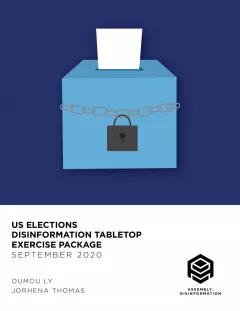
Exercises simulate disinformation, foreign influence operations targeting November election
Publication provides the intelligence community, social media companies, state election officials, and news media a resource to plan for the election
The United States 2020 presidential election will take place amidst a confluence of extraordinary challenges. A global pandemic keeps much of the US population isolating at home. Electronic voting systems and processes are known to be insecure, and it is all but certain that the integrity of the overall vote will be called into question as votes are tallied from absentee and in-person ballots. To make matters worse, the country is experiencing a volatile political environment. Misinformation and disinformation litter the information ecosystem with half truths and deliberate manipulations, sowed by domestic and foreign actors looking to influence public opinions and divide individuals. Social change movements and public demonstrations are taking place in-person across the country, and sometimes they are met by violent counter protests. It's hard to recall an election that took place in the US during such a turbulent and uncertain time.
Recent elections in the US and across the democratic world have demonstrated the extent to which a functioning democracy relies on trust in institutions and traditionally authoritative sources of information, and that the emerging “new normal” for democratic processes – disinformation, influence operations, and foreign interference – stands to undermine democracy by eroding trust in institutions.
Meeting these challenges requires an unprecedented effort among a diverse group of stakeholders who must be able to anticipate and react to the wide range of political and cybersecurity challenges expected to arise during and after the November 2020 election. To this end, structured exercises can assist this range of stakeholders, as well as others, as they establish protocols for deploying interventions, work to build public resilience to influence efforts, and explore collaborative approaches to dealing with the threats to the upcoming election as well as future elections.
The publication features four exercises designed for four key stakeholders working on the front lines of the election: state and local election officials, the US intelligence community, news media, and technology platforms. Exercises in this publication were crafted to encourage a broad conversation about responses to disinformation, highlight potential gaps in current response planning, and foster dialogue about how to deploy interventions to protect the election.
Berkman Klein Center Staff Fellow Oumou Ly co-authored the publication with Jorhena Thomas, Adjunct Professorial Lecturer at the American University’s School of International Service, building on discussions and research by the Center’s Assembly: Disinformation Program, which brings together participants from academia, industry, government, and civil society from across disciplines to explore disinformation in the digital public sphere.


